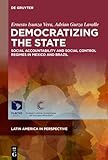Democratizing the State : Social Accountability and Social Control Regimes in Mexico and Brazil / Adrian Gurza Lavalle, Ernesto Isunza Vera.
Material type: TextSeries: Latin America in Perspective : Society, Culture and Politics ; 3Publisher: Berlin ; Boston : De Gruyter, [2024]Copyright date: 2025Description: 1 online resource (XXII, 146 p.)Content type:
TextSeries: Latin America in Perspective : Society, Culture and Politics ; 3Publisher: Berlin ; Boston : De Gruyter, [2024]Copyright date: 2025Description: 1 online resource (XXII, 146 p.)Content type: - 9783111061856
- 9783111062853
- 9783111062266
- Civil society -- Latin America
- Democracy -- Latin America
- Political participation -- Latin America
- Brasilien
- Demokratie
- Lateinamerika
- Mexiko
- Partizipatorische Demokratie
- Politische Beteiligung
- Politische Vertretung
- Verantwortlichkeit
- SOCIAL SCIENCE / General
- Accountability
- Brazil
- Democracy
- Latin America
- Mexico
- Participatory Democracy
- Political Participation
- Political Representation
- 320.98 23/eng/20241028
- JL966
- online - DeGruyter
- Issued also in print.
| Item type | Current library | Call number | URL | Status | Notes | Barcode | |
|---|---|---|---|---|---|---|---|
 eBook
eBook
|
Biblioteca "Angelicum" Pont. Univ. S.Tommaso d'Aquino Nuvola online | online - DeGruyter (Browse shelf(Opens below)) | Online access | Not for loan (Accesso limitato) | Accesso per gli utenti autorizzati / Access for authorized users | (dgr)9783111062266 |
Frontmatter -- Foreword: Participatory institutions and democratic governance -- Acknowledgments -- Contents -- List of Acronyms -- List of Figures, Tables, and Graphs -- Introduction: Democratization of the State and Regimes of Social Control in Mexico and Brazil -- Chapter 1 Democratic Control of the State: Why Does it Matter? -- Chapter 2 From Social Accountability to Social Control Regimes -- Chapter 3 Social Control Regimes in Mexico and Brazil as Sociopolitical Configurations -- Chapter 4 The Prevalent Experiences and Social Control Regimes in Mexico and Brazil -- Chapter 5 Exemplary Cases. Policy Management Councils, Committees of the Contraloría Social, and National Consultative Councils -- Conclusion -- References
restricted access online access with authorization star
http://purl.org/coar/access_right/c_16ec
Democratic institution-building experiences, innovative forms of social organization, and the development of multiple state-society interfaces represent a significant political phenomenon in Latin America in the last half-century. By comparing the two largest countries of the subcontinent, Brazil and Mexico, Democratizing the State examines social accountability and social control regimes. These regimes are conceived configurations of relationships between actors, organizational structures, norms, and resources, all arranged in a stable and institutionalized manner to exert social control over state actors and functions. The book addresses the contrasting characteristics and different functions through which the citizenry and civil society exert control over state action in both countries. Characterizing these experiences broadly as regimes is novel and enlightening regarding the work of practitioners and scholars on political participation, social accountability, and democracy in the global South and the global North.
Issued also in print.
Mode of access: Internet via World Wide Web.
In English.
Description based on online resource; title from PDF title page (publisher's Web site, viewed 20. Nov 2024)


